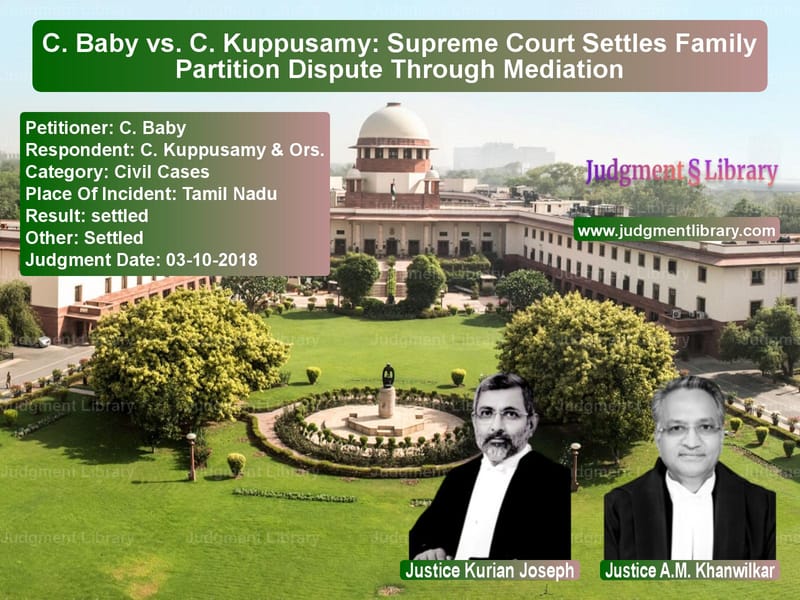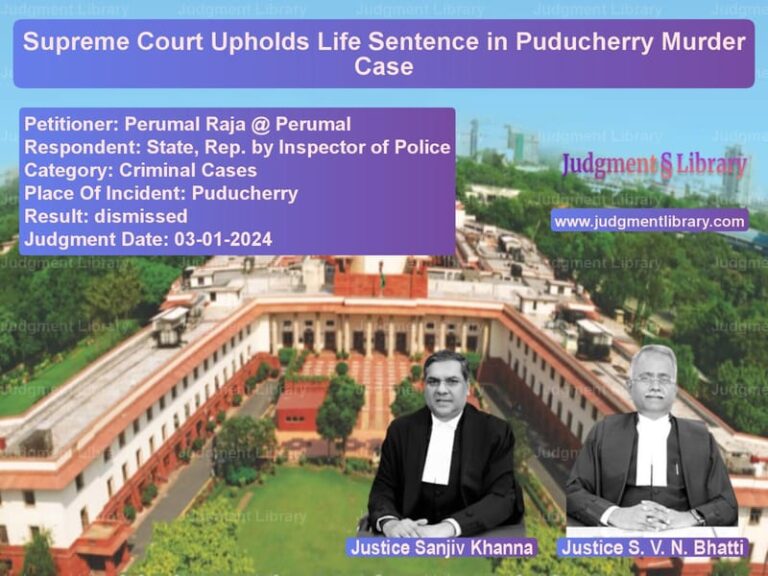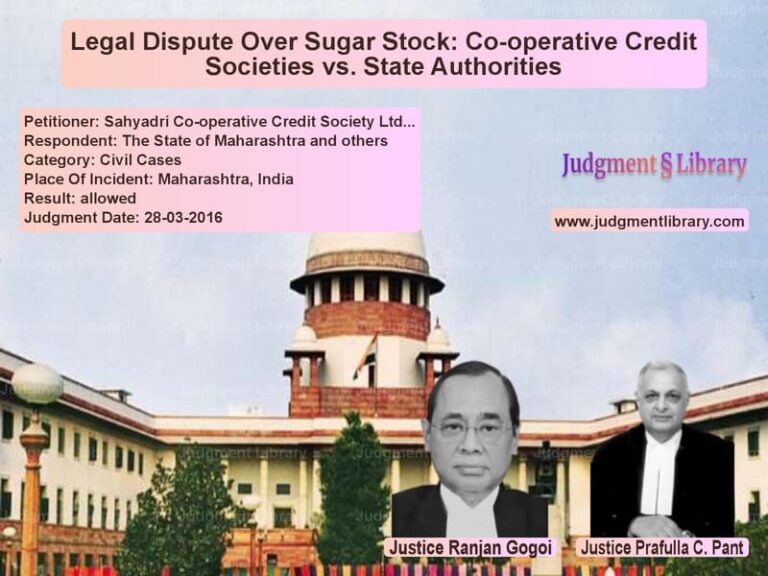C. Baby vs. C. Kuppusamy: Supreme Court Settles Family Partition Dispute Through Mediation
The case of C. Baby vs. C. Kuppusamy & Ors. is a significant ruling by the Supreme Court of India, which demonstrates the effectiveness of mediation in resolving family property disputes. The dispute revolved around the partition of ancestral property among family members, and the Supreme Court facilitated an amicable resolution through court-appointed mediation, ultimately settling the long-standing legal battle.
Background of the Case
The appellant, C. Baby, and the respondents, C. Kuppusamy (respondent 1), their mother (respondent 2), and another sibling (respondent 3), belonged to the same family and were entangled in a legal battle over partition of ancestral property. The family members had disagreements over the division of the property, and despite attempts at resolution, the matter had escalated to litigation.
The primary issues in the case were:
- Dispute over the division of family property.
- Conflicting claims made by each party regarding their entitlement.
- Failure of prior negotiations to reach a consensus on a fair partition.
- Escalation of the matter to the courts due to prolonged discord.
The case was initially filed in a lower court, where the parties failed to reach a settlement. After multiple rounds of litigation, the matter reached the Supreme Court of India.
Supreme Court Proceedings
The case was heard by a bench comprising Justice Kurian Joseph and Justice A.M. Khanwilkar. During the hearing on 1st October 2018, the Supreme Court sensed that an amicable resolution could be achieved through mediation. The Court inquired whether the parties were willing to resolve the matter outside of court, to which all parties responded positively.
Recognizing the possibility of a mutually agreeable settlement, the Court appointed Senior Advocate S. Nagamuthu as the mediator to facilitate discussions between the parties. The mediation process was carried out under the supervision of the Court, with a focus on ensuring that the interests of all parties were taken into consideration.
Mediation Process and Settlement
Under the guidance of the mediator, negotiations took place over several sessions. The parties were encouraged to adopt a practical and conciliatory approach. After detailed discussions, the family members reached an agreement, and on 3rd October 2018, they signed a Memorandum of Settlement detailing the terms of the partition.
The key aspects of the settlement included:
- Each party agreeing to a specific share in the property.
- Clear demarcation of individual ownership to prevent future disputes.
- Agreement on financial adjustments to ensure fairness.
- Resolution of any outstanding liabilities or encumbrances on the property.
The Supreme Court recorded the Memorandum of Settlement and officially disposed of the appeal in terms of the agreed terms.
Key Observations by the Supreme Court
The Supreme Court praised the mediation process and its effectiveness in resolving the dispute. The Court noted:
“Today, it is reported that the parties have amicably settled disputes among them. A Memorandum of Settlement signed by the parties and their respective counsel, on 03.10.2018, is also produced, which is taken on record.”
The Court further directed:
- The Trial Court to formally dispose of the pending suit in terms of the Memorandum of Settlement.
- Both parties to comply with the terms of the settlement in good faith.
- An honorarium of Rs. 2,00,000 to be paid to Senior Advocate S. Nagamuthu for his valuable mediation efforts. This amount was to be shared equally between the disputing parties.
Final Judgment
The Supreme Court:
- Allowed the appeal in terms of the settlement.
- Directed the Trial Court to implement the settlement agreement.
- Disposed of all pending applications.
- Declared that there would be no further costs imposed on the parties.
Legal Precedents and Significance
This judgment aligns with prior Supreme Court rulings emphasizing alternative dispute resolution (ADR) methods, such as mediation and conciliation, in family disputes. The case highlights the following legal principles:
- Encouragement of mediation to resolve familial conflicts amicably.
- Judicial oversight in ensuring fair settlements between parties.
- Equitable partition of family property in accordance with legal principles.
- Efficiency in resolving disputes without prolonged litigation.
Impact of the Judgment
The case serves as an important precedent for families involved in property disputes. It underscores the advantages of mediation over prolonged litigation, highlighting:
- Cost-effectiveness as compared to lengthy court battles.
- Faster resolution of disputes.
- Less emotional strain on family members.
- Fair and balanced distribution of assets.
Conclusion
The case of C. Baby vs. C. Kuppusamy showcases the power of mediation in resolving family disputes. The Supreme Court’s intervention in facilitating the settlement demonstrates its commitment to promoting peaceful resolution over adversarial litigation. This ruling reinforces the need for disputing parties to explore mediation before resorting to prolonged legal battles.
Petitioner Name: C. Baby.Respondent Name: C. Kuppusamy & Ors..Judgment By: Justice Kurian Joseph, Justice A.M. Khanwilkar.Place Of Incident: Tamil Nadu.Judgment Date: 03-10-2018.
Don’t miss out on the full details! Download the complete judgment in PDF format below and gain valuable insights instantly!
Download Judgment: C. Baby vs C. Kuppusamy & Ors. Supreme Court of India Judgment Dated 03-10-2018.pdf
Direct Downlaod Judgment: Direct downlaod this Judgment
See all petitions in Property Disputes
See all petitions in Judgment by Kurian Joseph
See all petitions in Judgment by A M Khanwilkar
See all petitions in settled
See all petitions in settled
See all petitions in supreme court of India judgments October 2018
See all petitions in 2018 judgments
See all posts in Civil Cases Category
See all allowed petitions in Civil Cases Category
See all Dismissed petitions in Civil Cases Category
See all partially allowed petitions in Civil Cases Category







